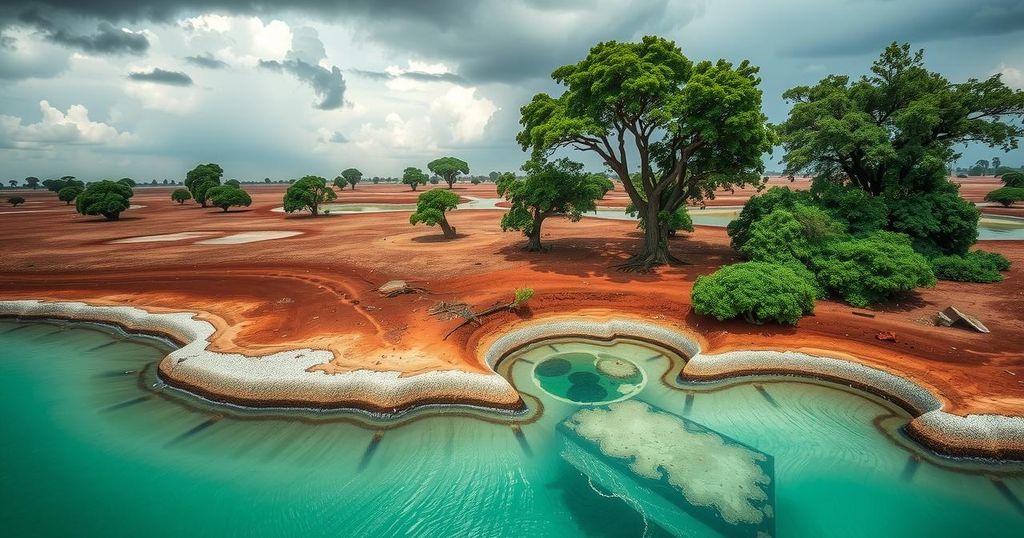World news
AFRICA, CHI, CHIDO, CLIMATE, CLIMATE CHANGE, CLIMATE CHANGE AND METEOROLOGICAL SERVICES, FRENCH INDIAN OCEAN, GLOBAL WARMING, GUY TAYLOR, INAM, LUCY MTILATILA, MALAWI, MOZAMBIQUE, NATIONAL INSTITUTE OF METEOROLOGY, NATURAL DISASTERS, PARIS AGREEMENT, PEMBA, UNICEF, ZIMBABWE
Amira Khan
0 Comments
Cyclone Chido Strikes Mozambique and Malawi: A Growing Climate Crisis
Cyclone Chido has devastated northern Mozambique and displaced thousands in Cabo Delgado and Nampula provinces. The cyclone’s impact highlights the increasing frequency of such extreme weather events due to climate change. Major humanitarian concerns are raised regarding education disruption and health risks, emphasizing the need for improved disaster preparedness and international support.
Cyclone Chido has inflicted severe damage in northern Mozambique, striking after making landfall in the Comoros archipelago. The cyclone has led to significant displacement in Cabo Delgado and Nampula provinces, with reports indicating that similar storms have increasingly battered southern Africa in recent years. Experts highlight that climate change is exacerbating these extreme weather events, with rising Indian Ocean temperatures contributing to cyclone formation.
Lucy Mtilatila, Director of Climate Change and Meteorological Services in Malawi, noted that the frequency of tropical cyclones has escalated dramatically, emphasizing that they were previously rare occurrences. Cyclone Chido has brought destructive winds reaching 160 mph and heavy rainfall, leading to casualties and extensive infrastructural damage. The humanitarian response has commenced, with UNICEF voicing deep concerns regarding immediate and long-term effects, including education disruptions and potential outbreaks of waterborne diseases.
Preliminary assessments suggest a necessary focus on disaster preparedness at all levels of governance, with Mtilatila praising improvements in coordination among various sectors. Despite ongoing recovery efforts from previous cyclones, the increased severity and frequency of these weather events pose significant challenges. There is also a pressing need for infrastructure development and adaptation strategies to bolster community resilience against future calamities.
As the Malawian government preemptively procured food and relief supplies, the region’s vulnerability was again underscored, exacerbated by previous agricultural challenges due to climate factors. Various humanitarian organizations emphasize the urgency for enhanced international support to address climate change’s underlying causes while rebuilding effectively post-disaster. Mtilatila highlighted that as communities learn from these experiences, efforts must focus on building resilience as they prepare for the future.
The southern African region has seen a troubling rise in the frequency and intensity of cyclones, attributed largely to climate change. This phenomenon is characterized by increasingly severe weather patterns impacting countries such as Mozambique and Malawi, both of which are still in recovery from previous natural disasters. Cyclone Chido, among the latest of these storms, epitomizes the urgent challenges faced in addressing climate change and its ramifications on vulnerable communities.
In conclusion, Cyclone Chido represents a significant escalation in the climate crisis affecting Mozambique and Malawi, with immediate and long-term repercussions for affected populations. Enhanced disaster preparedness, infrastructure improvement, and community resilience are essential for mitigating the consequences of such extreme weather events. Urgent international support is required to address the root causes of climate change and assist these nations in rebuilding efforts while preparing for future cyclones.
Original Source: www.dw.com




Post Comment